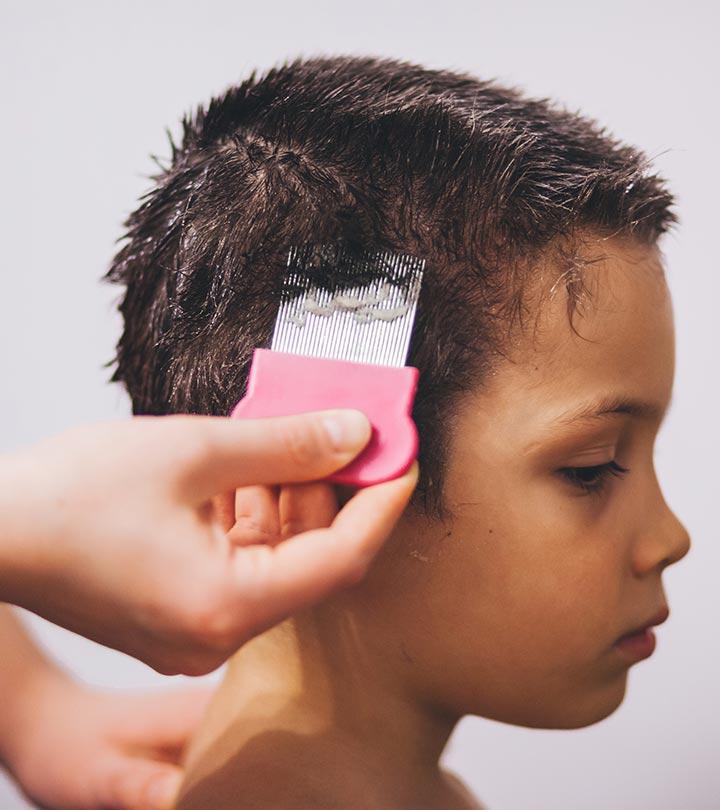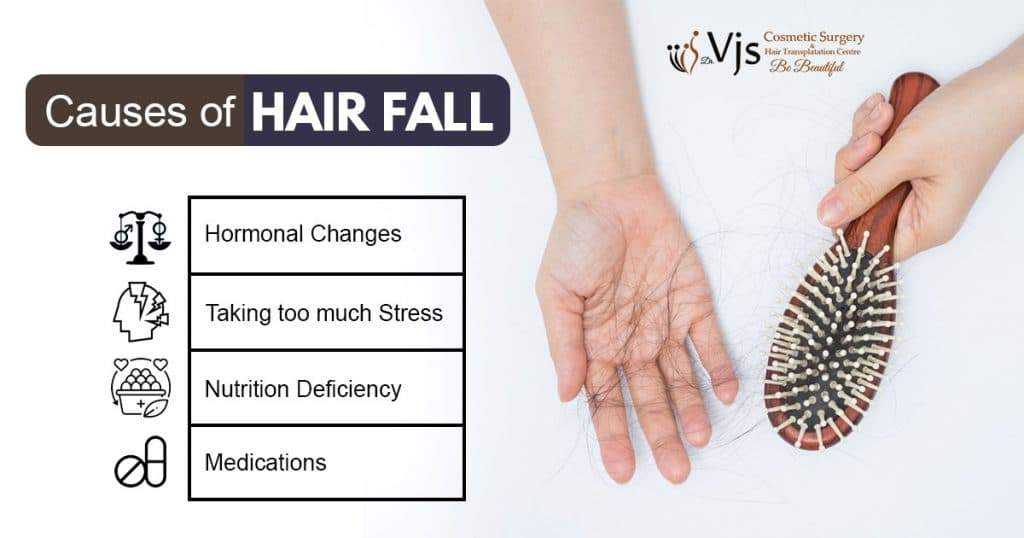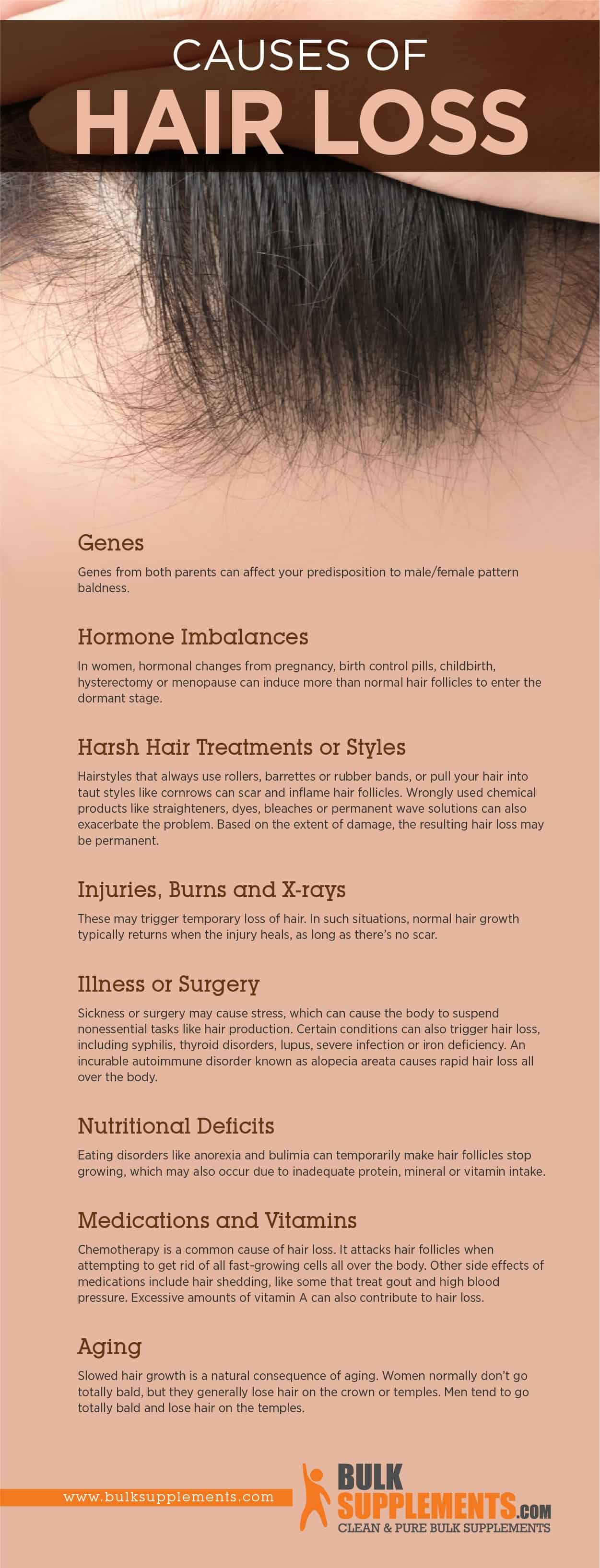Table Of Content

Hair fall can be caused due to environmental pollutants or poor hair care routine. In some cases, it could be due to an underlying health problem. Whatever is the cause of the hair fall, knowing about it is important for getting the right treatment. Although telogen effluvium doesn’t typically lead to baldness, it may lead to hair appearing thin, especially around the temples and crown of the head. Did you know that we all shed around 100 strands of hair per day, which is totally okay? Compared to the average total number of hair strands on one’s head, this is just a very small fraction.
Women and Hair Loss: Causes
Ingesting large amounts of warfarin, an ingredient in rat poison, can also lead to hair loss. Taking toxic amounts of vitamin A and selenium can also lead to hair loss. Hair loss during pregnancy is not common, but it is possible. During pregnancy, people are more likely to have conditions that cause hair loss, like hyperthyroidism, hypothyroidism, and iron-deficiency anemia. Treating these conditions can help hair thickness return.
Hair Shedding vs. Hair Loss
Some types of treatment aren’t safe to use if you’re pregnant, planning on becoming pregnant or going through menopause. Most baldness is caused by genetics (male-pattern baldness and female-pattern baldness). The best remedy for hair loss is determined by its cause but can be addressed by medication, topical treatments, laser therapy, and hair transplant surgery. The Minimalist Hair Growth Serum is an effective solution when it comes to addressing problems of alopecia or baldness. It helps grow your locks longer and strengthens roots while minimising their fallout.
What are the treatment options for hair loss?
These are some the many reasons we see our hair fall out. Most hair loss in men is caused by androgenetic alopecia or male pattern hair loss. This type is genetic—passed from parent to child—and progresses gradually. It typically affects the hairline, temples, or top of the head. Linked to the activity of the androgen receptor (AR) gene, up to 50% of male adults experience some form of this by age 50.
What are the types of hair loss?

As with medical conditions, physical changes that stress the body, especially if they cause hormonal changes, can lead to excessive hair shedding. This usually happens a few months after the stressor occurs and stops when the body's hormone levels have readjusted. When this occurs, as much as 70% of scalp hair can fall out, often in handfuls, around two months after the trigger.
Does Creatine Cause Hair Loss? What to Know - Verywell Health
Does Creatine Cause Hair Loss? What to Know.
Posted: Thu, 21 Dec 2023 08:00:00 GMT [source]
However, it is common, and in most cases, it is also temporary. While immediate results might take time, consistent effort with these tips can significantly improve hair health and reduce falls. Addressing underlying causes, adopting gentle hair care practices, and nourishing your body from within will put your hair back on the path to strength and shine.
Causes and treatments for hair loss
Hormone changes during menopause can also contribute to this type of baldness. Hair transplant surgery involves moving small plugs of skin, each with a few hairs, to bald parts of your scalp. If they suspect an autoimmune or skin condition, they might take a biopsy of the skin on your scalp.
Typically, the most common types of hair loss are treated with topical or oral medications, which will likely be the first course of treatment. Alopecia areata is an autoimmune condition that causes your immune system to attack hair follicles, resulting in bald patches that can range from small to large. Shrinking can begin as early as your teens, but it usually starts later in life.
15 Best Shampoos for Thinning Hair (Tests & Reviews 2024) - Cosmopolitan
15 Best Shampoos for Thinning Hair (Tests & Reviews .
Posted: Wed, 03 Apr 2024 07:00:00 GMT [source]
Hair loss risk factors
This involves carefully removing several small sections of skin for laboratory testing. Yes, hair tends to regrow when you are no longer exposed to the poison. A scalp infection can lead to scaly and sometimes inflamed areas on your scalp.

In men, hair loss is often caused by reactions to the predominant male reproductive hormone, testosterone. Many factors affect these levels, with other diseases or conditions leading to different types of hair loss. And any medical conditions that lead to hair loss should be treated directly to address the condition, not just its symptoms. Androgenic alopecia causes the normal hair growth cycle to shorten.
Your scalp hair can last up to six years or even longer. A 2018 review suggests that a vitamin D deficiency may link to hair loss. The authors also suggest that to help prevent hair loss, people low in iron would benefit from iron supplementation and making sure they get enough vitamin C. If a person thinks that hair loss may be due to a medication, they can consult a doctor for an assessment.
Hair loss can sometimes be a sign of an underlying disease. If your hair loss results from medication, hormonal imbalances, thyroid disease or diet, your provider will address the cause. Correcting the underlying problem is often all that’s needed to help stop hair loss. Stopping hair loss indefinitely depends upon the underlying cause. As a general rule, the sooner you treat hair loss, the more likely you will be able to reverse or reduce the rate of hair loss. Hair loss can also be a side effect of some medications, especially chemotherapy medications to treat cancers.
Also, because hair follicles shrink during this time, your hair might be thinner, fall out easier, and grow more slowly. Women with hair loss due to alopecia areata may consider treatment with corticosteroids applied to the scalp or injected into multiple sites in the affected area. People with alopecia areata may also benefit from immunosuppressive medications like methotrexate. Stress causes a large number of hairs in the active hair growth (anagen) phase to abruptly enter the resting (telogen) phase. When the hairs reenter the growth phase, the hairs that had been suspended in the resting phase are suddenly released.
It is worth noting that this method is unlikely to benefit or help people with scarring alopecias. They may also order blood tests to check for any nutrient deficiencies or signs of an underlying condition. These patches, sometimes called a kerion, can cause scarring as well. A scalp infeciton can lead to scaly and sometimes inflamed areas on your scalp. You can search by location, condition, and procedure to find the dermatologist that’s right for you. Minoxidil may irritate your scalp and cause dryness, scaling, itching and/or redness.
However, it pays to always be attentive to any slight changes in the amount of hair you find on your pillows, tops, hairbrushes, and bathroom floor drain. If you do find an increase, don’t be alarmed as this may not be something serious but just a simple hair fall problem. Get to the bottom of things by knowing the reasons why hair fall problems occur. Hair loss caused by a thyroid condition usually appears as a uniform thinning across your scalp. Hair loss is most common in people with severe or prolonged thyroid disease.

No comments:
Post a Comment